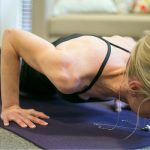 On a Sunday night at my yoga studio, there was a hard vinyasa flow class in the schedule followed by restorative accessible yoga. I chose to go for the hard vinyasa as I felt that’s what my body needed – a good workout with some heat. When I arrived, there was a teacher there who I hadn’t met before. She immediately looked at me and told me that I was an hour early for the restorative yin class.
On a Sunday night at my yoga studio, there was a hard vinyasa flow class in the schedule followed by restorative accessible yoga. I chose to go for the hard vinyasa as I felt that’s what my body needed – a good workout with some heat. When I arrived, there was a teacher there who I hadn’t met before. She immediately looked at me and told me that I was an hour early for the restorative yin class.
The teacher took one look at my disability and assumed that there was no way I could be there for a more physical class and that assumption was only limiting my abilities.
I am, in fact, able to do a lot of things in harder vinyasa classes and sometimes more than the rest of the class.
I told her that no, I was there for her vinyasa class and took my position. I found myself for the next 60 minutes in my head about how I had to prove myself. I always find the more dynamic classes are far better for my pain management but I felt myself putting in more energy than I usually would in this class purely because of this assumption that was made about me and my abilities.
I have a very strong “I’ll prove you wrong” attitude that I have built up in myself. But I can only think that others in that same position could have been so disheartened by this assumption and not done something that they, not only wanted to do, but knew that they could.
Assumptions we put on others usually put them into a box of being unable to do something. When we assume something, which we all do a lot of the time, we’re adding an invisible barrier around their abilities.
In reality, what would have been best is for this teacher to ask “are you here for vinyasa?” and I could have confidently told her “YES I AM!” and enjoyed the class a lot more.
It never hurts to ask instead of assume. Although, most of the time this is done with good intentions of looking after someone, asking a question is so much more empowering to the person.
In that way, we can be mindful about supporting their chosen experience, not protecting them and limiting them to what we might assume is best.
We want to be challenged by the class, not by assumptions.
What assumptions do you make that inadvertently hinder another’s performance?